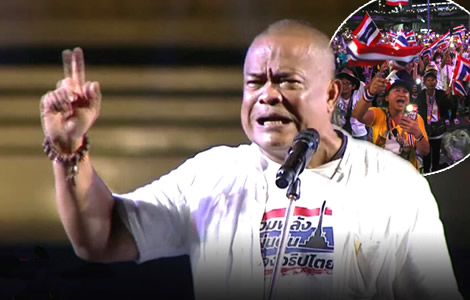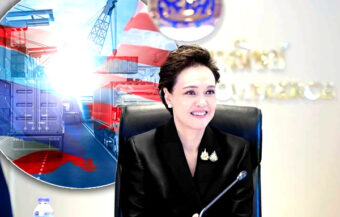Conservative protesters surged onto a Bangkok roundabout, condemning the US-backed ceasefire as a national humiliation. Led by Jatuporn Prompan, they demand PM Paetongtarn Shinawatra’s immediate resignation and vow to march on Government House .
Thailand’s conservative protest movement hit Bangkok’s streets again on Saturday. The crowd started small, shadowed by a heavy police presence, but swelled as night fell. Former Redshirt leader Jatuporn Prompan led a fiery lineup of speakers demanding the Pheu Thai government be ousted—no compromises. Jatuporn and others slammed the ceasefire deal, blaming the U.S. involvement on July 28th for its collapse. The rally ended with a fierce promise: next time, march straight to Government House and force the government out. No more waiting or excuses.

Former redshirt leader Jatuporn Prompan launched a fierce verbal attack on acting Prime Minister Phumtham Wechayachai during a nationalist rally held Saturday evening at Bangkok’s Victory Monument. “This ceasefire deal is a national humiliation,” Jatuporn declared to the crowd.
He sharply criticised Phumtham for finalising the agreement without consulting military commanders. This, he argued, allowed Cambodian forces to capture Prasat Ta Kwai just before the truce took effect.
Initially, the rally attracted around 1,000 participants. However, as the evening progressed, more people joined. Still, the crowd fell far short of the 20,000 expected by organisers. Meanwhile, authorities deployed over 2,000 police officers. This heavy presence reflected serious concerns about potential unrest.
Speakers targeted government and military ties amid nationalist rally at Bangkok’s Victory Monument
From the start, speeches were aggressive. Many targeted the Pheu Thai-led coalition government. They demanded a complete break with the military’s political influence. “We cannot accept any ties that compromise our national defence,” one speaker said firmly. The atmosphere was charged with nationalist fervour and distrust of both political elites and foreign powers.
Acting Defence Minister Nattapol Nakpanit became a primary target of criticism. Protesters accused him of ordering Thai troops to stand down during recent clashes along the Cambodian border. However, the Army spokesman, Lt. Gen. Winthai Suvari, quickly denied these allegations. “Our soldiers did not retreat,” Winthai said. “They moved to tactical defensive positions near Hill 250 in Ubon Ratchathani province.”
He explained the area was designated a “kill zone,” where heavy fighting was expected. Therefore, the troops’ movement was strategic, not a sign of weakness. Winthai also denied claims about abandoning posts at Prasat Ta Kwai and Hill 350. Instead, he insisted Thai forces aimed to block Cambodian advances.
Protesters reject ceasefire timing and link it to political failings during King Rama X’s birthday
Nevertheless, protesters remained unconvinced. They argued the ceasefire’s timing was suspicious. Importantly, the 31st Infantry Regiment had not reached full combat readiness when the truce was declared. “This left our troops vulnerable,” a protest leader said. Many viewed the ceasefire as a poorly timed political move that ceded territory unnecessarily.
Jatuporn spoke with a sense of urgency and frustration. He condemned the ceasefire, especially since it was agreed upon on King Rama X’s birthday. “Agreeing to this ceasefire on His Majesty’s birthday leaves a scar on our national pride,” he said. Jatuporn linked the crisis to the return of Thaksin Shinawatra. In his view, Thaksin’s presence inflamed tensions with Cambodia and weakened Thailand’s diplomatic stance. “This entire ceasefire arrangement is unforgivable,” he added.
Lawyer Nitithorn Lamluea, widely known as Nokhao, echoed these sentiments. He accused foreign powers of pressuring Thailand into the ceasefire. “Malaysia and the United States forced this unwanted agreement,” Nitithorn told the crowd. He called for protests outside the U.S. Embassy and urged demonstrators to prepare to surround Government House if tensions escalated.
Throughout the rally, the crowd chanted patriotic slogans and sang songs like “We Fight,” led by singer Sumet Ong-art. The stage was draped in red, white, and blue, symbolising national unity. Speakers praised Thai soldiers while condemning Cambodian “aggressors.” The atmosphere was one of defiance and solidarity.
Protesters demand immediate resignation of the PM and call for unity to protect Thailand’s sovereignty
Protesters issued three core demands. First, they called for the immediate resignation of Prime Minister Paetongtarn Shinawatra. They insisted she step down without waiting for any court decision. Second, they demanded that all coalition parties exit the Pheu Thai-led administration. Third, they urged political forces to unite in protecting Thailand’s territorial integrity.
Protest leader Pichit Chaimongkol made a dramatic accusation. He claimed Paetongtarn compromised national security during a leaked phone call with Cambodian Prime Minister Hun Sen. According to Pichit, her tone was overly conciliatory and encouraged Cambodia to escalate the conflict. Moreover, Pichit criticised ceasefire talks held in Malaysia. He argued these talks ignored crucial issues like Cambodia’s use of landmines and repeated border violations.
As a result, protest leaders now reject third-party mediation altogether. They demand future talks be bilateral — strictly between Thailand and Cambodia. However, this is not what is happening.
The Cambodian newspaper, the Khmer Times, reported that although Thailand initially rejected international observers, it later allowed ASEAN, China, and U.S. representatives to attend the final day of talks. Deputy Defence Minister Gen Nattaphon Narkphanit confirmed this later in an official letter.
Protesters plan to monitor border talks but insist outside mediation undermines Thai sovereignty
Protesters plan to closely monitor the General Border Committee talks, set to begin in Kuala Lumpur on August 4th. Despite official approval of international participation, protest leaders argue it undermines Thai sovereignty. “We cannot trust any outside mediator,” Nitithorn stated firmly.
Jatuporn closed the rally by calling for a national march. The demonstration will move from Victory Monument to Government House. “This is not just a protest. It is a national rescue mission,” he declared.
The crowd erupted with approval. He also blamed Thailand’s political elite for the crisis. According to Jatuporn, bitter rivalries between elite families had cost both civilian and military lives. “This is not about parties,” he said. “It’s about saving the country.”
Despite the ceasefire, tensions remain high near contested border areas. Military reports show Thai troops continue patrolling. Meanwhile, Cambodian forces reportedly maintain forward positions near Prasat Ta Kwai.
Some units are believed to have mined the area again. The Thai Army insists its main goal is containment, not escalation. Official briefings say units are ordered to hold key terrain but avoid provocation.
Critics warn military inaction risks escalation as political tensions rise amid court rulings and unrest
Still, critics argue this amounts to inaction under fire. Political analysts warn that the situation is fragile. Multiple court rulings are pending, including a lèse-majesté verdict in a case against Thaksin on August 22nd. This will be followed by a September 9th ruling on the execution of Thaksin’s prison sentence from August 2023. These decisions could increase tensions further. Government officials are preparing for potential unrest.
Many observers see the protest movement as a bid to trigger a broader political crisis. This would resemble past upheavals in 2006 and 2014. Those earlier crises began with protest rhetoric and ended in military coups. Protest leaders deny any intention of provoking a coup. Instead, they call for a “political reset” to rebuild trust in institutions.
Cabinet meets after Cambodian ceasefire. Acting PM Phumtham spoke later with Trump for 30 minutes
Ceasefire in effect across Thai-Cambodian border conflict zone, wary officials to meet later for review
World hears what happened in Sisaket. Cambodia used Chinese rocket systems to target civilians in a war crime
Whether Thailand faces another major rupture is unclear. While nationalist momentum is undeniably growing, it may lack the critical mass of support seen over a decade ago. The government currently appears vulnerable to pressure from both domestic protests and foreign influence.
However, this is a different era, with the country’s largest political party by far—the People’s Party—still committed to democratic norms.
Overall, the situation remains tense and uncertain. Protesters are demanding immediate political change and a stronger defense of national sovereignty. At the same time, the military is seeking to avoid escalation while maintaining border security. This delicate balance will undoubtedly test Thailand’s political stability in the coming weeks.
Join the Thai News forum, follow Thai Examiner on Facebook here
Receive all our stories as they come out on Telegram here
Follow Thai Examiner here
Further reading:
Cabinet meets after Cambodian ceasefire. Acting PM Phumtham spoke later with Trump for 30 minutes
Acting PM travels to Kuala Lumpur for ceasefire talks. Cambodia’s PM Hun Manet to attend amid PR war
Hot War rages on the Thai-Cambodian border following Cambodian troops offensive in Chong Bok area


















